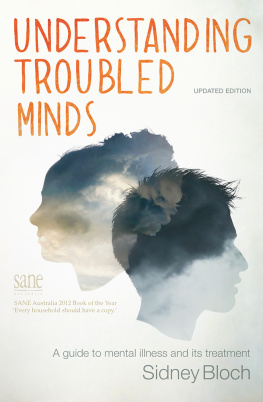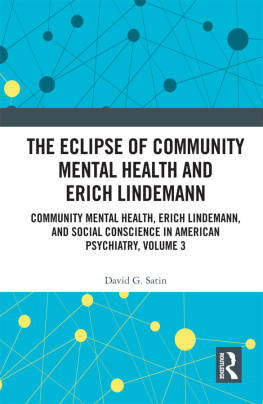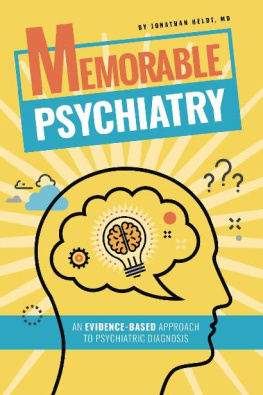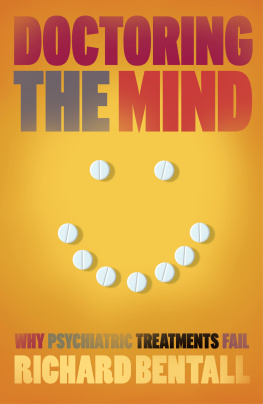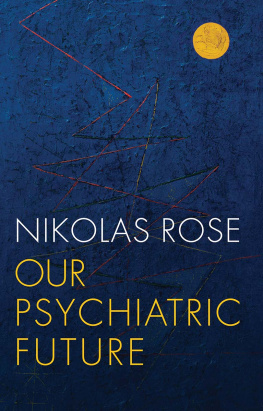Contents
Guide
Page List
Psychiatry: Past, Present, and Prospect
Edited by
Emeritus Professor Sidney Bloch
University of Melbourne, and
Honorary Consultant, St Vincents Hospital,
Melbourne, Australia
Professor Stephen A. Green
Clinical Professor of Psychiatry,
Georgetown University School of Medicine,
Washington DC, USA
Professor Jeremy Holmes
School of Psychology,
University of Exeter, UK


Great Clarendon Street, Oxford, OX2 6DP,
United Kingdom
Oxford University Press is a department of the University of Oxford.
It furthers the Universitys objective of excellence in research, scholarship, and education by publishing worldwide. Oxford is a registered trade mark of Oxford University Press in the UK and in certain other countries
Oxford University Press 2014
The moral rights of the authors have been asserted
First Edition published in 2014
Impression: 1
All rights reserved. No part of this publication may be reproduced, stored in a retrieval system, or transmitted, in any form or by any means, without the prior permission in writing of Oxford University Press, or as expressly permitted by law, by licence or under terms agreed with the appropriate reprographics rights organization. Enquiries concerning reproduction outside the scope of the above should be sent to the Rights Department, Oxford University Press, at the address above
You must not circulate this work in any other form and you must impose this same condition on any acquirer
Published in the United States of America by Oxford University Press
198 Madison Avenue, New York, NY 10016, United States of America
British Library Cataloguing in Publication Data
Data available
Library of Congress Control Number: 2013957435
ISBN 9780199638963
Printed and bound by
Clays Ltd, St Ives plc
Oxford University Press makes no representation, express or implied, that the drug dosages in this book are correct. Readers must therefore always check the product information and clinical procedures with the most up-to-date published product information and data sheets provided by the manufacturers and the most recent codes of conduct and safety regulations. The authors and the publishers do not accept responsibility or legal liability for any errors in the text or for the misuse or misapplication of material in this work. Except where otherwise stated, drug dosages and recommendations are for the non-pregnant adult who is not breast-feeding
Links to third party websites are provided by Oxford in good faith and for information only. Oxford disclaims any responsibility for the materials contained in any third party website referenced in this work.
Preface
The provenance of this volume of essays is twofold. We editors, all at roughly the same stage in our careers, were contemplating our impending retirement. We wondered about writing a combined memoir that would address the highlights and frustrations of the more than four decades of clinical practice, teaching, and research. The prospect was exciting and intriguing, covering as it would scientific discoveries of all kinds, biological and psychological, advances of treatment, conceptual breakthroughs, and fiery intellectual debates on an inexhaustible range of topics. We also wanted to face up to psychiatrys negative side: perennial indecisiveness about the professions boundarieswhether to promote an ambitious social vision or confine its activities strictly to the medical clinic; the limitations of a narrow approach to human suffering, dominated by arbitrary diagnosis; the retreat from the hope of a deinstitutionalized, community-based psychiatry; the divide between biological treatments and psychotherapy; the technical and ethical complexities of psychiatric research; and the low priority given to psychiatry, especially but far from exclusively in less developed countries. We would also have to deal with ethical challenges facing the profession, such as maintaining the basic human rights of severely disturbed patients while at the same time recognizing that many of them are unable to act independently without risk of harming themselves or others.
A second rationale for producing such a memoir was a shared perception of deficiencies in training experienced by our junior colleagues. Increasingly, they lack a developmental perspective for their patients and are taught to concentrate almost exclusively on the present and the immediate future with an emphasis on the questionable procedures of risk assessment. In addition, as they embark on their odyssey they havein our viewa relatively meagre knowledge of the contemporary history of psychiatry, especially at the level of oral and personal experiences.
We then posed the question: would it not be to the advantage of trainees to hear directly from the elders of the professiontheir observations, feelings, and fantasies about psychiatry from graduation as psychiatrists through to retirement? They could learn of our initial foray into the clinical setting, and the sense of excitement as we began to get to know our patientstheir tantalizing life stories and inner mental livesas well as our anxiety as to whether we were sufficiently equipped to help, let alone cure them.
The 1960s saw the end of the 350-year era of the asylum. However enlightened an innovation in mental health care this was in its inception as the Enlightenment took over from a religious context for conceptualizing mental illness, it had failed to rehabilitate most of its occupants. This was due to a lack of core scientific knowledge, inadequacy of rational treatments, and the degeneration of asylum conceived as caring and benevolent, to one of custodial regimentation. The early 1960s offered reason for cautious optimism, as stigma began to recede, more effective medicines were discovered, and psychosocial concepts and therapies devised. A collective memoir, we surmised, had the potential to provide a balanced picture of these changes, highlighting their benefits, as well as unanticipated and unwelcomed consequences.
Appealing as the memoir idea seemed, were we adequately equipped to write an authoritative and comprehensive narrative? Would our perspective on a half-century of developments and limitations be broad enough? Though we disliked the increasing fragmentation and subspecialization of medicine, from which psychiatry has not been immune, we had to acknowledge that there were many subjects where each of us had no direct experience or expertise. Then came the obvious solution: why not recruit renowned and respected colleagues who, like ourselves, were nearing the end of their active career? We would invite them to reflect on the area of psychiatry to which they had devoted their energies, culminating in much-lauded contributions. Our new aim was for a text comprising a set of perspectives written in essay form by an esteemed group of colleagues. That is what we now offer.
Having arrived at this overall objective, we settled on the following goals:
1 To promote the curiosity of mental health professionals about key developments in psychiatry over the past half-century and thus deepening their understanding of the historical context within which they work;
2 Within Santayanas rubric of Those that do not learn from the past are destined to repeat it, to sensitize the next generation of mental health professionals to the role they might play in advancing the state of knowledge about mental illness and its treatment during the course of their careers;


